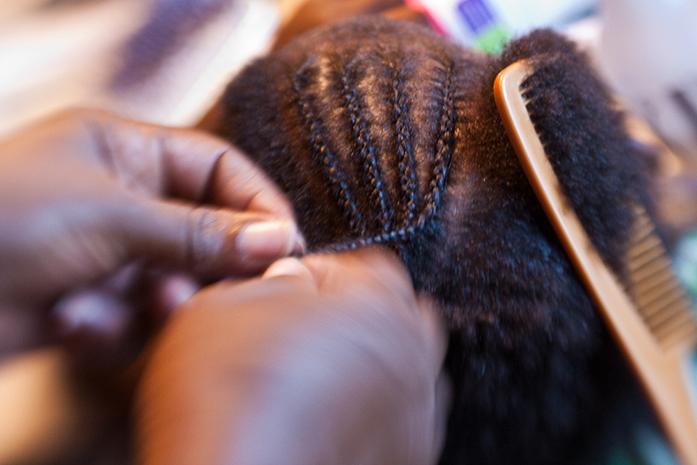By Vivian Medithi
Iowa Gov. Terry Branstad has ended licensing for natural hair braiding in Iowa, a victory for many African-Americans and African immigrants in the state. Previously, laws had required a full cosmetology license to perform natural hair braiding, requiring 2,100 hours of schooling and upwards of $22,000.
In his line-item veto, Branstad noted that the proportion of licensed jobs in Iowa has increased dramatically, from 1 in 20 in the 1950s to 1 in 3 today. Many licensed jobs require excessive training, sometimes not even related to the career the license is for. For example, the cosmetology license hair-braiders were previously required to obtain is not required to teach natural hair techniques, meaning braiders would shell out tens of thousands for classes that have little to do with their career, if anything at all.
Lack of access to economic opportunity is often a “hidden” cost of white supremacy, a result of generations of slavery and ongoing institutionalized racism. American capitalism is supposedly a meritocracy, scalable by hard work, either physical or mental. Yet from the start, white students were favored to the detriment of their black and Latino peers. While the achievement gap is initially small, by the eighth grade, racial disparities become more apparent and continued to accumulate.
In the Iowa City School District, the high-school graduation rate for white students is 93 percent, compared with 85 percent for Latino students and 80 percent for black students. Early disparities snowball into black students receiving less quality education than their white peers, even when they come from identical backgrounds and attend the same schools. In Iowa, black students are more likely to be disciplined than their white peers and less likely to receive additional attention and help from teachers when they need it.
Access to education is tied intimately to class, which in turn is tightly bound to race/ethnicity. This ultimately means that when businesses look for the “most qualified” person for a job, entire demographics are eliminated because of race and class-based constraints people have very little control over.
This problem extends far beyond Iowa of course. According to a White House report from last summer, unfair licensing regulations disproportionately affect people of color and ultimately have nationally led to “substantial costs on job seekers, consumers, and the economy.” The Texas Supreme Court echoed these beliefs when it struck down many licensing regulations on eyebrow threading, deeming them unconstitutional. These victories for marginalized workers are critical and also highlight the widening economic gulch among ethnicities. While many Americans still want to pretend the legacy of slavery is long dead, the truth is that the impact of the transatlantic slave trade is still being felt today. Licensing regulations are simply a screwdriver in the toolkit of systemic oppression: inequality in education, oppressive voter registration, police brutality, fetishization, and redlining are just a few of the others.
If we really want to make America great again, we have to make America something it’s never been before: equal. We need to push school boards to hire more diverse staff in our schools and introduce racial training for teaching staff. We need to combat the ruthless gentrification of people’s homes in places such as Rose Oaks. We need to dismantle racist barriers to opportunity in our communities from the local to the national level. The United States has always claimed to be the land of opportunity: how wonderful would it be if that were true.



